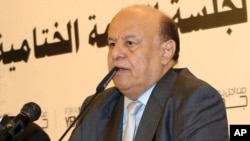The United States threw its support behind Yemen's Abed Rabbo Mansour Hadi on Monday, with an American envoy referring to the contested president as the country's "legitimate" leader.
A visit by U.S. Ambassador Matthew Tueller to the southern Yemeni city of Aden, where Hadi set up base after Houthi rebels held him under house arrest in the capital and forced his resignation, was their first public meeting since Washington closed its embassy last month in Sana'a.
A militia takeover in the capital that brewed for months culminated with a claim to power by Houthi leadership in January.
U.S. State Department spokeswoman Jen Psaki said the United States will "continue engaging Yemenis and the international community to support Yemen’s political transition," which is guided by several internationally-brokered agreements.
Hadi came to power in 2012, the result of a hand-over of power from long-time leader Ali Abdullah Saleh under the Gulf Cooperation Council Initiative.
The United Nations Security Council has also backed Hadi as Yemen's legitimate president since the attempted Houthi ouster that has politically crippled the country. Multiple UN-mediated peace talks have failed to reconcile the rebel militia's political ambitions with the recognized government.
The Houthis again raised long-standing questions this week about the extent of their relationship with Iran, as group leaders signed off on an agreement to establish regular flights between Tehran and rebel-controlled Sana'a.
Yemen experts have told VOA that despite the characterization of the Houthis as a Shi'ite group in a majority Sunni country, the militia's agenda is a political one, not religious.
VOA correspondent Pamela Dockins contributed to this report.





